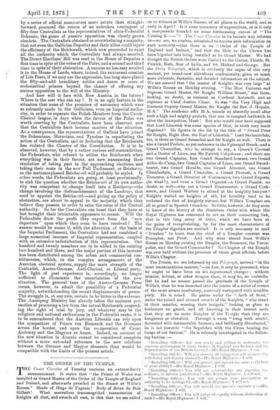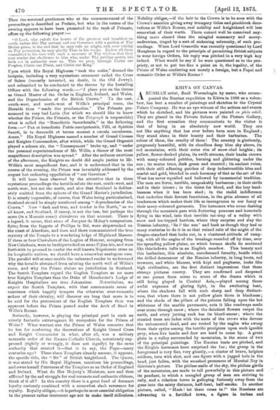THE ORDER OF THE TEMPLE.
THE Court Circular of Tuesday contains an extraordinary announcement. It states that " the Prince of Wales was installed as Grand Master of the Order of the Temple of England and Ireland, and afterwards presided at the dinner at Willis's Rooms." Shade of Hugo de Paganis ! Body of Brian de Bois
Gilbert! What marvellous transmogrified resuscitation of Knights all dust, and swords all rust, is this that we are called ou to witness at Willis's Rooms, of all places in the world, and so
early in April? Is it some mummery of superstition, or is it only a masquerade founded on some forthcoming cantos of " The Coming K—"? The Court Circular in its laconic way informs 1 us—we are, we confess, astonished to receive such information on such authority—that there is an " Order of the Temple of England and Ireland," and that the Heir to the Crown has been beguiled into being installed as its Grand Master. We had thought the British Orders were limited to the Garter, Thistle, St. Patrick, Bath, Star of India, and SS. Michael and George. But the Daily Telegraph, which is evidently the organ of this very ancient, yet brand-new chivalrous confraternity, gives us much more elaborate, fantastic, and detailed information on the subject. We are assured that " the muster of Knights was very large " at Willis's Rooms on Monday evening. " The Most Eminent and Supreme Grand Master, Sir Knight William Stuart," was there, looking, no doubt, as eminent as Cardinal Antonelli and as supreme as Chief Justice Chase. So was " the Very High and Eminent Deputy-Grand Master, Sir Knight the Rev. J. Huyshe,
M.A." The academic affix M.A. sounds so absurdly small after such a high and mighty prelude, that one is tempted forthwith to utter the interjection, Hush ! But who would ever have supposed
that Lord Limerick was some species of friar, in truth very much disguised? He figures in the list by the title of " Grand Prior
Sir Knight, Right Hon. the Earl of Limerick." Lord Skelmersdale,
too, is there as Grand Seneschal and Sir Knight as well. There is also a Grand Prelate, as yet unknown to the Episcopal Bench; and a Grand Chancellor, who is, strange to say, a Queen's Counsel and a Doctor of Laws, one Sir Patrick Colquhoun; and there are two Grand Captains, four Grand Standard-bearers, two Grand Aides-de-Camp, two Grand Captains of Lines, one Grand Sword- bearer, two Grand Heralds, one Grand Almoner, one Grand Chamberlain, a Grand Constable, a Grand Provost, a Grand Treasurer, a Grand Director of Ceremonies, two Grand Experts, (in what ?), and even a Grand Organist—a Grand Pianist, no doubt, as well—why not a Grand Toastmaster, a Grand Cork- screw, and Grand Waiters to attend at the knightly banquet ? Knights waited on knights of old, for humility used to be reckoned the first of knightly virtues, but Willis's Templars are all as grand as Spanish Grandees. So little, however, do they seem to know of the history of the illustrious Order with which His ' Royal Highness has consented to act as their connecting link, that in this long array of titles, which we have been at
the pains of recapitulating, by far the most characteristic of the Templar dignities are omitted. It is only necessary to read "Ivanhoe" to learn that the chief of a Templar convent was Preceptor, not Prior. And why were absent from Willis's Rooms on Monday evening the Drapier, the Banneret, the Turco- polier, and the Grand Commander ? No Chapter of the Temple was ever held without the presence of those great officials before Willis's Chapter.
The Prince, we are informed by the Telegraph, arrived " in the most unostentatious manner,"—on foot, it may be presumed, when he ought to have been on his caparisoned charger ; without armour, helmet, or other weapon than, it may be, an umbrella. But he had no sooner passed the precincts of the Temple of Willis's, than he was launched into the centre of a series of scenes
of the most arrant tomfoolery, curiously variegated with maudlin piety. He is robed. He passes under the " Arch of Steel," under the raised and crossed swords of the Knights, " who stand in their mantles, wearing their insignia," looking as glum as beefeaters on guard, and all knowing in their inmost souls that they are no more Knights of the Temple than they are kangaroos or cherubim. Through a room " hung with scarlet, decorated with innumerable banners, and brilliantly illuminated," he is led towards "the Sepulchre with the Cross bearing the image of our Saviour." He is solemnly interrogated in the follow- ing fashion :-
"Installing Officer: Arc you ready and willing to undertake the supremo government of these Orders in England cud Ireland, and the Dependencies of the British Crown?—Ilia Royal Highness : I am.
"Installing Officer : Will you observe all things that will promot3 the well-being and dignity thereof ?—His Royal Highness : I will.
"Installing Officer : Will you protect and uphold the same to the host of your. ability ?—His Royal Highness: I will.
"Installing Officer: You will not acknowledge any superior, co- ordinate, or inferior jurisdiction ?-1Iis Royal Highness: I will not.
"Installing Officer: You will not permit your prerogative or authority to be infringed ?—His Royal Highness: I will not.
"Installing Officer: You will uphold the Queen's suprema7:—His Royal Highness: I will.
"Installing Officer: You will judge all equally without distinction of rank?—His Royal Highness: I will."
Then the reverend gentleman who at the commencement of the proceedings is described as Prelate, but who in the course of the evening appears to have been promoted to the rank of Primate, offers up the following prayer :—
" 0 Lord, who ruIeth the hearts of the greatest and humblest on earth, imbue this Thy servant and our Governor with a portion of Thy Divine grace, to the end that ho may rule us aright, and, over relying on Thy protection, he may glorify Thee in his works. Endow all those committed to his care with such a measure of Thy wisdom that they may render duo obedience to him who, under Thy guiding power, has been set in authority over us. This wo pray, through Christ our Prophet, Christ our Priest, and Christ our King."
Upon which His Royal Highness "took the oaths," donned the insignia, including a very mysterious ornament called the Cross of Salem (recently invented, no doubt, in the Old Jewry), and submitted to be conducted to the throne by the Installing Officer with the following words :—" I place you on the throne as Grand Master of the Order in England, Ireland, and Wales, and the Dependencies of the British Crown." To the east, south-west, and north-west of Willis's principal room, the Heralds then " made due proclamation." The Primate pro- nounced in very bad Latin (for which we should like to know whether the Prince, the Primate, or the Telegraph is responsible) what is called the "Benedictio Sacerdotalis," in the following form :—" Pax et benedictio Patris omnipotentis, Filii, et Spiritils Sancti, in to descendit et tecum maneat a esecula smculorum. Amen." His Royal Highness named a number of Grand Crosses and Knights Commanders, after which, while the Grand Organist played a solemn air, the " Encampment " broke up, and "under the personal superintendence of Mr. Willis, a dinner of the moat magnificent description was spread." After the arduous exertions of the afternoon, the Knights no doubt did ample justice to Mr.
Willis's most magnificent fare, and it is understood that in the course of the evening, the Prince was invariably addressed by the august but endearing appellation of " our Governor."
It will have been observed by the attentive that in these mysterious proceedings the heralds salute the east, south-west, and north-west, but not the north, and also that Scotland is deliber-
ately omitted from the sphere of the Grand Master's jurisdiction. It is utterly impossible, of course, that Wales being particularised, Scotland' should be simply numbered among " dependencies of the Crown." Now "dark and true, and tender is the North," as we all know, and Scotland, if canny, is not the less, but perhaps the more (in a Masonic sense) chivalrous on that account. There is a legend, it seems, that some of Jacques de Molay's companions,
flying from the faggots of Phillips le Bel, were shipwrecked on the coast of Aberdeen, and then and there communicated the true mystery of the Temple to a wondering lodge of Highland Masons.
If three or four Chevaliers of the Legion of Honour, escaping from New Caledonia, were to beshipwrecked on some Fijian isle, and were forthwith to proceed to confer the well known Napoleonic cross on its hospitable natives, we should have a somewhat analogous case. The parallel will at once enable the unlearned reader to understand why the heralds abstained from saluting the north wall of Willis's room, and why the Prince claims no jurisdiction in Scotland. The Scotch Templars regard the English Templars as no more true Knights Templars than the Duke of Manchester's Lodge of Knights Hospitallers are true Johanniter. Nevertheless, we expect the Scotch Templars, with that consummate sense of canniness which happily tempers the otherwise over-romantic ardour of their chivalry, will discover ere long that more is to be said for the pretensions of the English Tempters than was apparent before the Prince passed under the Arch of Steel in Willis's Rooms.
Seriously, however, is playing the principal part in such an utterly fantastic extravaganza fit occupation for the Prince of Wales ? What warrant can the Prince of Wales conceive that he has for conferring the decorations of Knight Grand Cross and Knight Commander in what, after all, was a military monastic order of the Roman Catholic Church, notoriously sup- pressed (rightly or wrongly, it does not signify) by the same authority that created it—that is to say, the Pope—many centuries ago? These sham Tempters already assume, it appears, the specific title, the " Sir" of British knighthood. The Queen, it was stated by His Royal Highness, sanctions his proceedings, and owns herself Patroness of the Templars as an Order of England and Ireland. What do Her Majesty's Ministers, now and then afflicted by the sad struggle for real coronets and authentic ribbons, think of it all? In this country there is a great fund of dormant loyalty curiously combined with a somewhat slack reverence for
royalty. Royalty obliges,—it is perhaps its most essential obligation in the present rather irreverent age not to make itself ridiculous.
Nobility obliges,—if the heir to the Crown is to be seen with the Crown's sanction giving away trumpery titles and pinchbeck deco- rations at Willis's Rooms, real nobility and knighthood will lose somewhat of their worth. There cannot well be conceived any- thing more absurd than the mingled mummery and merry- andrewism, tinged by a sort of sickening solemnity,. of such pro- ceedings. When Lord Granville was recently questioned by Lord Houghton in regard to the principle of permitting British subjects to wear foreign Orders, his reply was pitched in a very high key indeed. What would he say if he were questioned as to the pro- priety, or not to put too fine a point on it, the legality, of the Prince of Wales conferring not merely a foreign, but a Papal and monastic Order at Willis's Rooms ?



































 Previous page
Previous page